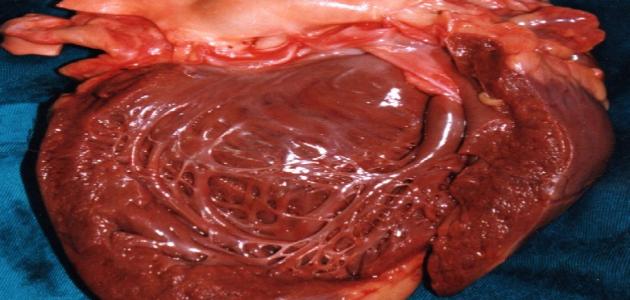Contents
An enlarged heart
The enlarged heart is not a disease in itself but it is a sign of the presence of another disease linked to heart; Thus, his treatment depends on treating the cause that leads to it, and cardiac enlargement refers to the large size of the heart that appears in the images that are made of the heart, including the chest X-ray, and it should be noted that the patient may not know the presence of an enlarged heart. However , after making the necessary tests or in the event of the onset of symptoms associated with the disease that causes enlarged heart , the more inflated the discovery of the heart early results were better. [1] [2]It is worth noting that there are many types of enlargement of the heart, the most important of which is Dilated cardiomyopathy. In it, the walls of both ventricles in the heart become thin as it expands, but in other types the left ventricle becomes thicker. [3]
Symptoms of an enlarged heart
An enlarged heart usually has no symptoms in mild cases, but some symptoms and signs may appear in moderate to severe cases, especially at a time when the heart becomes unable to pump blood well. Symptoms similar to those of congestive heart failure begin to appear, including the following: [1] [3]
- Shortness of breath, especially when lying down or exertion.
- Swelling, especially in the foot, ankle and leg.
- pain in chest.
- Palpitations and irregular heartbeat heart .
- Weight gain, especially in the central area of the body.
- Feeling tired and dizzy.
- Coughing, especially when lying down.
Causes of an enlarged heart
Heart enlargement occurs in conditions that cause blood to pump more difficult than usual or if the heart muscles are damaged, and sometimes the cause may not be known. The following are the possible causes of the enlarged heart : [2]
- Congenital heart problems.
- Damage resulting from a heart attack, or an irregular heartbeat .
- High blood pressure: as high blood pressure leads to an enlargement of the left ventricle of the heart, which in turn gradually weakens the heart muscle, and it is possible that the effect of high blood pressure may extend to affect the atria of the heart.
- Heart valve disease: There are four valves in the heart that keep blood flowing properly, and the heart may enlarge if these valves are damaged by a disease such as rheumatic fever or due to an infection For example, infection of endocarditis, or due to exposure to drugs and radiation therapy for cancer.
- Anemia: When chronic anemia is not treated due to the lack of sufficient red blood cells to transport oxygen to the tissues of the body, the heartbeat accelerates or loses its regularity, and in this case the heart must pump more forcefully to match the lack of oxygen.
- Thyroid problems: may cause excessive thyroid activity , and hypothyroidism to heart problems, including heart swell.
- Hemochromatosis (hemochromatosis), in this disease the body does not metabolize iron properly. This leads to the accumulation of iron in various organs of the body, including the heart, and this in turn weakens the heart muscle and thus the left ventricle of the heart enlarges.
- Pregnancy: Pregnancy may lead to a temporary enlargement of the heart that will disappear after childbirth, but in certain cases medication is required. [1]
- Drugs and Alcohol: The temporary enlargement of the heart caused by the excessive use of drugs and alcohol will disappear once you stop using them. [1]
Diagnosing an enlarged heart
An enlarged heart may be diagnosed when the patient tells his doctor about the symptoms he is experiencing associated with the presence of congestive heart failure, and helps to diagnose an enlarged heart, knowing the medical history of the patient, in addition to a physical examination As the enlargement of the heart may lead to the presence of strange sounds that the doctor can distinguish through medical stethoscopes, and it is worth noting that the specialist doctor often performs an ultrasound of the heart, which does not cause pain or damage, and through it the size of the heart, the thickness of the muscles, and the ability The heart is pumping blood, and other tests that help the doctor diagnose an enlarged heart include the following: [3]
- Heart: catheter , through which it can know the size of the heart and its ability to blood, in addition to pumping out a blockage in the coronary arteries .
- Blood tests: Blood tests are done to find out the causes of enlargement of the heart, such as thyroid tests, and the examination that detects infection with some types of viral infections such as human immunodeficiency virus .
- Computerized tomography (CT scan) of the heart or magnetic resonance imaging (magnetic resonance imaging).
- Biopsy: In rare cases, the doctor may take a sample of heart tissue to find out the underlying cause of the enlarged heart.
Prevention of an enlarged heart
Controlling the risk factors associated with coronary artery disease such as smoking, high blood pressure, diabetes, and high cholesterol may reduce the risk of developing an enlarged heart or failure by reducing the chance of a heart attack, and the patient can reduce the risk of developing heart failure by adhering to a healthy diet. Not using drugs, drinking alcohol, controlling blood pressure through food, exercising, and taking medications prescribed by the doctor. [2]
References
- ^ A b c w Kristeen Cherney (27-6-2017), "What Is Mild Cardiomegaly?" , Www.healthline.com , Retrieved 27-12-2017. Edited.
- ^ A b T. Mayo , Clinic Staff (17-11-2017), "Enlarged heart 's " , Www.mayoclinic.org , Retrieved 28-12-2017. Edited.
- ^ A b T 30-8-2016, "Enlarged Heart View (Cardiomegaly)" , the www.webmd.com , Retrieved 27-12-2017. Edited.







